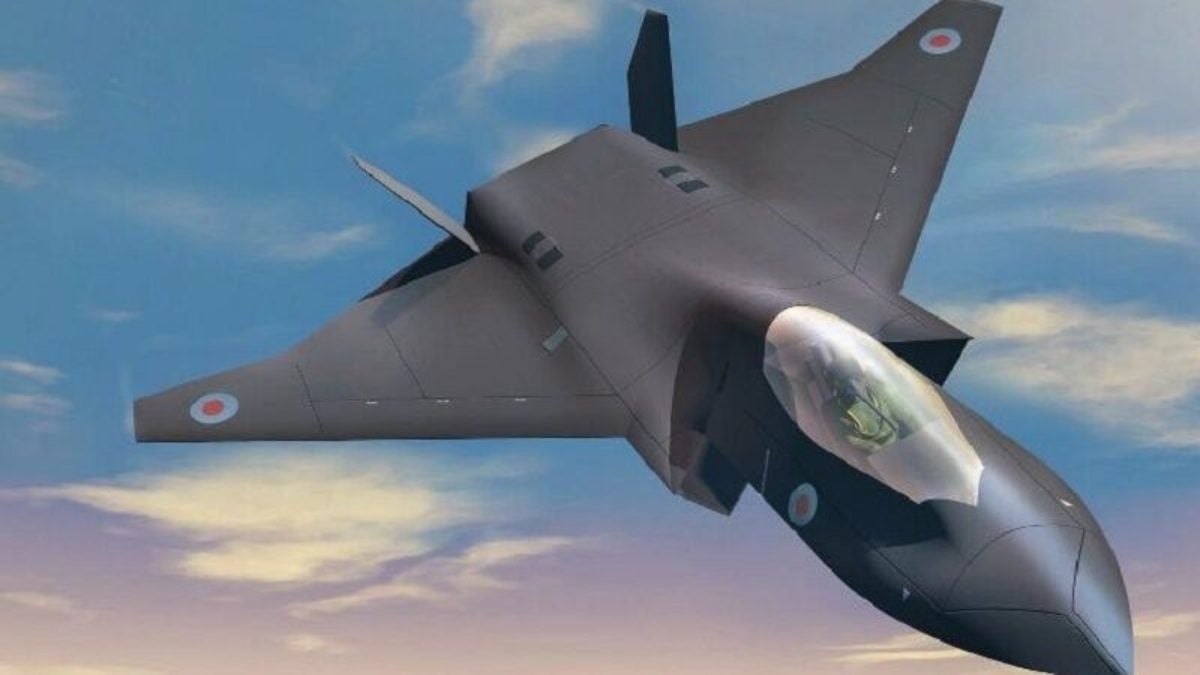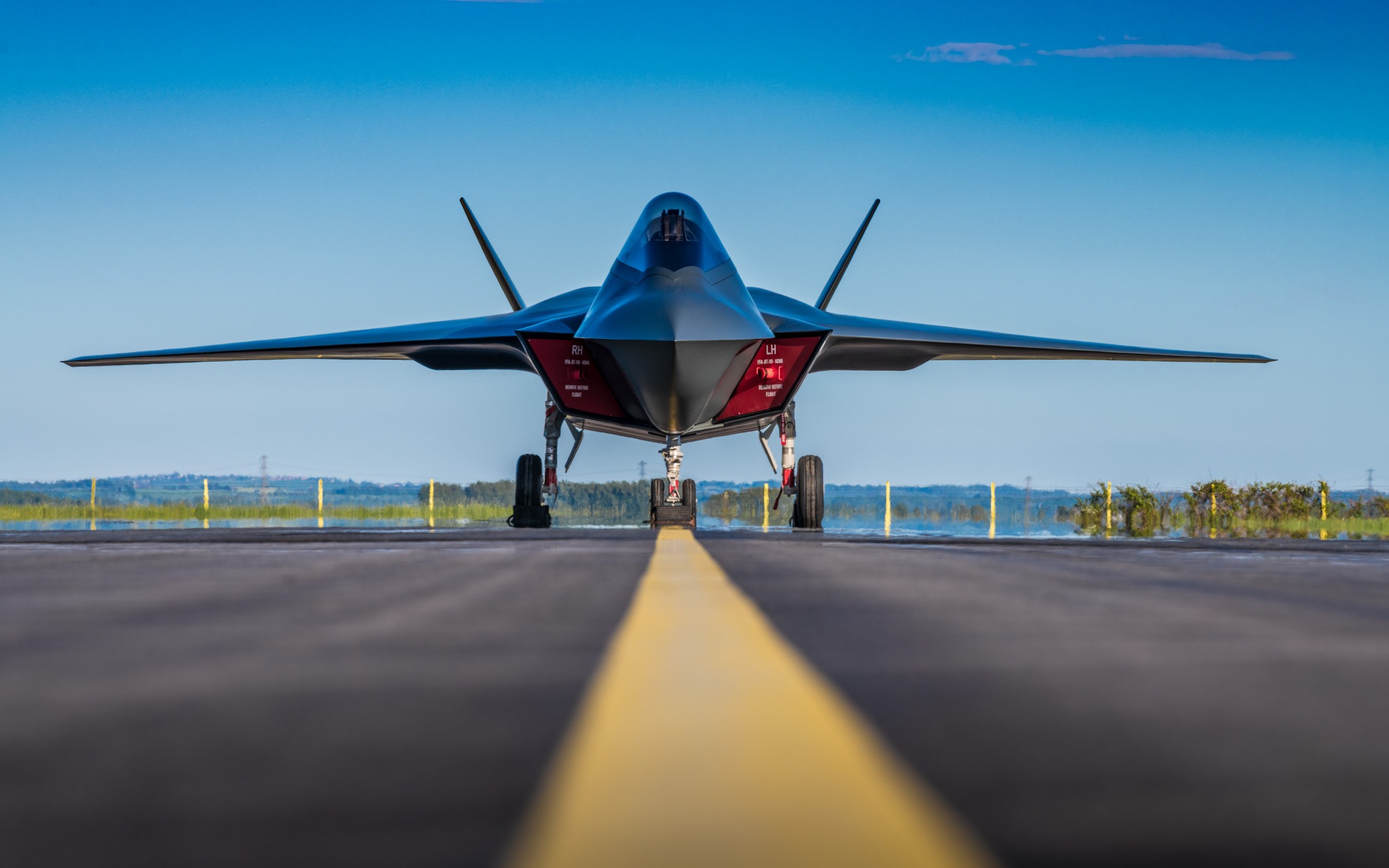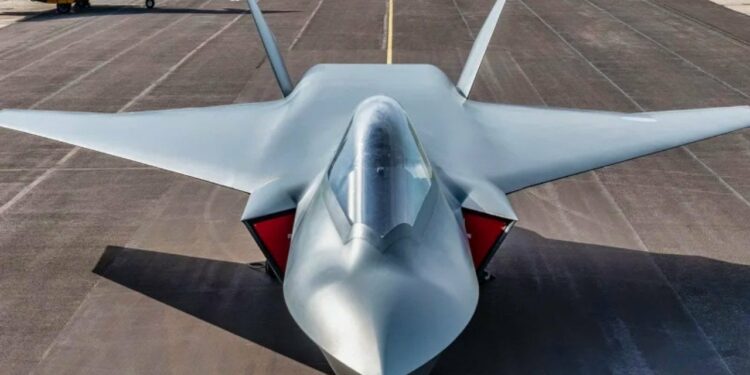-The fighter emphasizes speed, range, and payload over traditional dogfighting roles. Engineers from BAE Systems, Leonardo, and Mitsubishi Heavy Industries are collaboratively developing the aircraft, which is set to enter service in the mid-2030s.
-Despite earlier concerns, the UK’s new Labour government supports the program, ensuring its continued progress. The GCAP aims to create an advanced, interoperable fighter jet with intelligent weapon systems and next-generation radar, capable of processing 10,000 times more data than current systems.
GCAP’s New Fighter Model: A Leap Forward in Design and Capabilities
At this week’s Farnborough International Airshow 2024, the UK, Italy, and Japan unveiled a new concept model of the multinational next-generation fighter that is expected to be the centerpiece of the Global Combat Air Programme (GCAP). The new concept artwork for the future sixth-generation fighter highlighted its emphasis on speed, range, and payload – over a traditional dogfighting role.
As described by international military analyst firm Janes, the fighter features “a pure delta panform in place of the previously touted modified delta.”
“In the 18 months since the launch of the GCAP, we’ve been working closely with our industrial partners in Italy and Japan under the collaboration agreement, and also with the three governments, to understand and align requirements for a next-generation combat aircraft,” said Herman Claesen, managing director, Future Combat Air Systems, for lead UK company on the project BAE Systems. “The new model … shows notable progress in the design and concepting of this future fighter jet. We’ll continue to test and evolve the design, as we move closer towards the next phase of the programme.”
The new concept model is on display this week at the UK’s largest airshow, also emphasized how the design has evolved. In addition to the delta panform, the aircraft features a larger wingspan than previous concepts, including those of the UK’s Tempest. The changes were meant to improve the aerodynamics of the future combat aircraft.
“Engineers from across BAE Systems, Leonardo and Mitsubishi Heavy Industries are working together under a collaboration agreement on the design and development of the future combat aircraft using a range of innovative digital tools and techniques, including computer based modelling and virtual reality to evolve the aircraft’s design during its concepting phase,” the companies said in a joint statement.
GCAP is Already in Supercruise
Though the design of the sixth-generation fighter has evolved, the timeline hasn’t changed. The companies stated that the aircraft is still on track to enter service in the mid-2035s. The goal of the GCAP is still to develop an advanced, interoperable, adaptable, and connected fighter jet. It has also been touted to be equipped with “an intelligent weapons system, a software-driven interactive cockpit, integrated sensors and a powerful next generation radar” that can provide “10,000 times more data than the current systems.”

There had been speculation that GCAP may not have the same level of support from the UK’s new Labour government, but that doesn’t seem to be the case.
“We are heading towards 2025 at pace,” Claesen told Janes in Farnborough. “In readiness for 2025 to take on the international design and development contract, we have been working at phenomenal pace, and the key message is that pace has continued absolutely since the last time we got together [at Farnborough 2022], whether it is from a government point of view or whether it’s from an industry point of view.”
GCAP’s Triple Alliance
The UK and Italy’s Tempest program merged with the Japanese F-X project. In December 2022, the UK, Japan, and Italy signed an international treaty to collaborate on the development of an advanced front-line fighter. Though the name has changed, the goal has not.
Tempest was initiated to develop a replacement for the Eurofighter Typhoon, which is operated by both the Royal Air Force (RAF) and the Italian Air Force, while the F-X program was jumpstarted to produce an aircraft to replace the aging Japanese F-2 fighters. It is further worth noting that all three nations have adopted the Lockheed Martin F-35 Lightning II multirole fifth-generation stealth fighter – but appeared to be looking towards a sixth-generation combat aircraft.
“The pace of the programme is extraordinary, building on a solid foundation and industrial legacy in each country and government-led partnership. Since the treaty was signed in December 2023, the programme has seen strong commitment from each partner. Each brings different, but complementary, qualities and requirements. We are now working closely together to exchange knowledge, address common challenges, and achieve common goals,” added Guglielmo Maviglia, chief GCAP Officer at Leonardo.

It would seem among the sixth-generation fighter programs, GCAP may be the one that will supercruise its way to service – and while it may incorporate the latest stealth technology, the efforts to develop this aircraft aren’t being hidden from view.
Author Experience and Expertise: Peter Suciu
Peter Suciu is a Michigan-based writer. He has contributed to more than four dozen magazines, newspapers, and websites with over 3,200 published pieces over a twenty-year career in journalism. He regularly writes about military hardware, firearms history, cybersecurity, politics, and international affairs. Peter is also a Contributing Writer for Forbes and Clearance Jobs. You can follow him on Twitter: @PeterSuciu. You can email the author: [email protected].
All images are Creative Commons and/or Shutterstock. Image are from when the GCAP program was called Tempest.
Source link : https://nationalinterest.org/blog/buzz/gcap-europes-new-6th-generation-fighter-now-supercruise-211986
Author :
Publish date : 2024-07-24 00:11:11
Copyright for syndicated content belongs to the linked Source.



